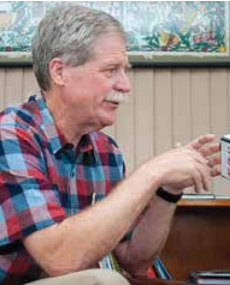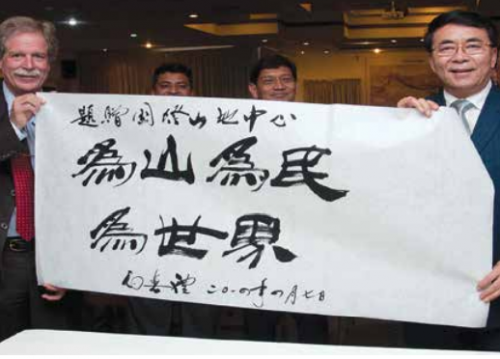
"I hope to see a clean and green Kathmandu in 20 years"
Following Prof. Bai Chunli's visit to ICIMOD, APD caught up with Dr. David James Molden, a development specialist with more than 30 years of experience, to know more about ICIMOD's influence on policy and practices tackling environmental and livelihood challenges in the Hindu Kush Himalayan (HKH) region.
1. Have you noticed any changes in Nepal since you were here first 20 years ago?
The biggest transformation coming in is Kathmandu itself, but I believe there are other changes that we witness in the countryside which are quite significant as well. One is migration. We are seeing much more movement of people and that gives special challenges to mountain areas. The impacts of climate change are felt stronger now compared to 20 years ago. The most striking manifestation is the change in glaciers and the snow coverage across mountain ranges. You see pictures of the Fish Tail Mountain, Machhapuchchre, twenty years ago and it is white, now you see a black, darker face. We have outstanding examples of retreat of glaciers and more glacier lakes forming, not just in Nepal but all across the Himalayan belt.
2. How would you explain ICIMOD as an information and knowledge hub?
ICIMOD has 8 member countries - China, India, Nepal, Bhutan, Pakistan, Afghanistan, Myanmar and Bangladesh. Environmental challenges are similar for mountain communities across the region. People have developed solutions to problems; we can share this knowledge across borders. A good example is flood early warning system. The idea is to set up a regional warning system where we share information that could save lives and properties. We have also made progress in sharing knowledge across borders about water as well as eco-system and biodiversity conservation. The Himalayas are the water towers of Asia.
About 1.3 billion people live along its 10 major river basins. We are working to understand the relation between water, glaciers and the permafrost and what will happen to water resources in the future. These are issues that the world should be concerned about because the food and energy security of so many people are dependent on these mountains.
3. In terms of sustainable development, what are the common challenges for ICIMOD's eight member countries?
There are definitely common challenges. Number one is climate change. In all our member countries (except Bangladesh) we have snow covered mountains, glaciers melt, possible shifts in monsoon patterns and changes in eco-systems dynamics. The region is also experiencing similar societal transformations, from migration to the persistence of poverty and globalization. The aspiration for a different kind of life is something you feel right across the region. The challenge is to deal simultaneously with the livelihoods of people, the environment and a changing world. This requires a more integrated thinking approach.
4. How to balance commercialization and environmental protection?
Commercialization and environmental protection do not have to be a contradiction. With eco-tourism, for instance, local communities benefit while having a smaller ecological footprint. Similarly, with value chains, farmers and companies can generate profit in a sustainable way. People from the cities appreciate organic food more and more so, why not grow that on the mountains? It is important to join hands with the business community. Not everybody sees that, especially from the environmental side. I believe there is a chance of partnership with the private sector that can enable sustainable development and be a good driving force.
Because of unplanned urbanization, Kathmandu Valley now encounters severe problems from water shortage to air pollution. Is there a way out?
Absolutely, there is a way out and it doesn't have to take that long. So many people have moved to Kathmandu; the city is just bursting. With development and an efficient water management system, I think some of these problems can be solved. Foremost, however, there must be a change in attitudes. People need to integrate this vision that in 10 or 20 years Kathmandu can be a clean and green city. In terms of water and waste management, if people feel part of a community they will start using resources wisely. We see a lot of pollution in the sky which is partly from Kathmandu and partly from the South where most industries are located. If we can introduce clean fuel for industries and cars, within a year the sky could clean up. In my opinion, with the advent of economic development people will demand a shift. Twenty years from now, I hope to come back to Kathmandu to see a beautiful, clean and green city.

5. Are you satisfied with ICIMOD's cooperation with China and China's role in the organization?
China's cooperation with ICIMOD has been very fruitful but I think it can be better. ICIMOD is 30 years old and China has been a member of ICIMOD since its inception. We have worked a lot on rangelands, ecosystems, snow and glaciers as well as livelihood programs with China.Our main partner is the Chinese Academy of Sciences (CAS). To take our collaboration to another level, there must be more engagement and MEND OR END 150 knowledge-sharing between China and third countries. We can improve in areas of regional science. From our side, it is important to get input from our programs in order to serve China better. ICIMOD is aiming high in terms of its collaboration with China.
During his official visit to the International Center for Integrated Mountain Development ( ICIMOD), a strategic partner for decades of the Chinese Academy of Sciences (CAS), on April 7th in Kathmandu, Prof. Bai Chunli (R) President of CAS writes a sheet of Chinese calligraphy and dedicates it to ICIMOD led by Dr. David james Molden (L) expressing lofty ideals--"for the mountain, for the people and for the world".
(This interview was published by the 9th edition of APD newspaper in 2014.)


